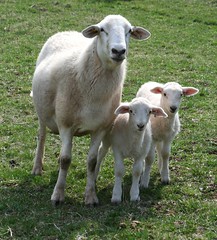 At the University of Missouri, 44 Romanov crossbred ewes were assigned to either a control diet or one enriched in n-6 polyunsaturated fats (PUFA), but otherwise equivalent, for four weeks prior to breeding until 13 days post-estrus. On day 13 of pregnancy, 129 conceptuses were recovered and their sex was determined.
At the University of Missouri, 44 Romanov crossbred ewes were assigned to either a control diet or one enriched in n-6 polyunsaturated fats (PUFA), but otherwise equivalent, for four weeks prior to breeding until 13 days post-estrus. On day 13 of pregnancy, 129 conceptuses were recovered and their sex was determined.Ewes on the enriched diet produced significantly more male than female offspring (69% vs. an expectation of 50%). The control diet did not cause sex ratio skewing. Body condition score did not differ between the ewes on the control and enriched diets. Nor was there any significant change in BCS scores in either group over the course of the experiment. The mean weight of the ewes was also the same in the two dietary groups and remained constant over the course of the experiment.
These results provide evidence that maternal diet, in the form of increased amounts of rumen-protected PUFA fed around conception, rather than maternal body condition, can skew the sex ratio towards males. Large-scale breeding trials are needed to determine whether these data can be translated to commercial livestock operations.
Source: Reproductive Biology and Endocrinology. June 2008.
